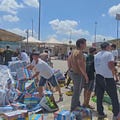In a chilling escalation of violence, right-wing activists have intensified their attacks on aid convoys delivering essential humanitarian relief to Gaza. This dire situation is worsening an already critical humanitarian crisis, painting a grim picture of life in the beleaguered region.
Earlier this week, an American nurse, trapped in a Gaza hospital, shared her gut-wrenching account of the conditions faced by medical staff and ordinary Palestinians. Her description was nothing short of "unimaginable," highlighting the sheer desperation permeating the area.
The attackers, are not only blocking the limited aid that manages to penetrate the siege but are further exacerbating conditions in parts of Gaza already suffering from famine. The brutality of their actions has caught the attention of US National Security Adviser Jake Sullivan, who voiced grave concerns over these assaults on aid convoys. Sullivan emphasized the challenges in securing the passage of aid through the critical Rafah and Kerem Shalom crossings, stressing the necessity for cooperation among the Israeli, Egyptian governments, and the United Nations.
Despite these official condemnations, alarming reports have surfaced suggesting that Israeli police and military forces are not adequately protecting the convoys. Instead, they are often seen standing idly by as these attacks unfold. A senior security official disclosed that the police have not only ignored the rioting and looting but have also provided information about the aid trucks' movements, effectively facilitating these violent ambushes.
Further compounding the issue, some members of the Israeli police are reportedly reluctant to confront the activists, hinting at possible sympathies with government officials who endorse the siege on Gaza. National Security Minister Itamar Ben-Gvir's office, which oversees the police, has been implicated in this apparent inaction.
The humanitarian situation in Gaza is dire. The northern part of the region is officially in famine, and the southern part is on the brink of similar conditions. An independent analysis has revealed over 80 attacks by the Israeli Defense Forces on aid shipments, suggesting a pattern rather than isolated incidents. This points to a deliberate policy aimed at restricting aid.
In a controversial move, the US is constructing a new military pier to facilitate aid delivery. This decision has raised eyebrows and concerns about its efficiency and safety, especially given the potential risks to US troops involved in the operation. Critics argue that this could replace existing, more efficient aid routes, questioning the true intent behind its establishment.
Adding to the outrage, recent footage shows settlers assaulting a Palestinian truck driver, who they believed was delivering aid. This horrifying incident underscores the pervasive hostility and the dangerous conditions aid workers face.
The international community must act swiftly to ensure the safe passage of humanitarian aid to Gaza and address the political issues underpinning this crisis. The ongoing attacks on aid convoys and the lack of accountability from the authorities must be condemned and rectified to prevent further suffering.
As this situation unfolds, supporting independent journalism and ground reporting becomes crucial to keeping the world informed about the harsh realities faced by those in Gaza. This is a call to action for global leaders and citizens alike to stand against these atrocities and support the humanitarian efforts desperately needed in the region.



